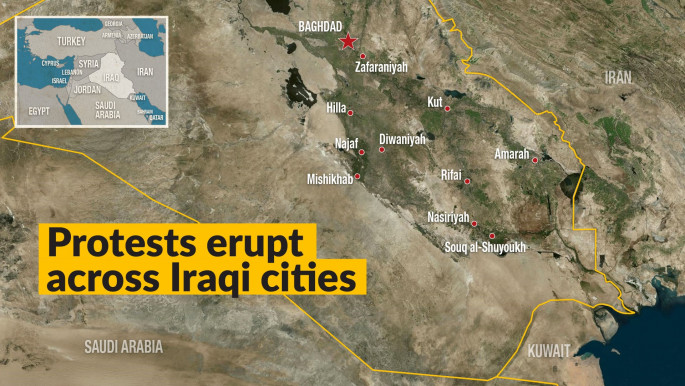Explainer: Why are people protesting in Iraq?
Security forces are suppressing the protest movement with brutal force, firing live ammunition at demonstrators that has led to a mounting death toll, while the government imposes curfews and internet blackout to thwart the movement's rapid growth.
Still thousands have taken to the streets under slogans such as "We Want Change", but what exactly is this change they demand, and why are they risking their lives to demand it?
Al-Saadi, IS and Iranian influence
Many consider the trigger for the protests to be the government's dismissal of the counter-terrorism chief, Lieutenant General Abdul Wahab al-Saadi, who played a key role in the defeat of the Islamic State group (IS) in Mosul, their de facto capital, in 2017.
 |
|
Many protesters have been holding up pictures of the military chief at the protests, blaming his dismissal on Iranian-backed politicians in the new government.
"Al-Saadi is considered a hero by many Iraqis across geographic and religious divides," explains Iraq-based journalist Adam Lucente.
Twitter Post
|
"There's a lot of pride in the Iraqi victory against IS and he is a symbol of that, but was removed by a fairly unpopular government," Lucente added.
Iranian influence in Iraqi politics was a key point of discontent in a country-wide outbreak of protests last year, and the country's fragile state, while caught in the crossroads of US, Iranian and Turkish interests, makes it vulnerable to external manipulation.
However this year, the protesters have focused primarily on domestic issues, argues Lucente.
Corrupt to the core
"There's definitely discontent surrounding unemployment and corruption among young people," Lucente told The New Arab.
Indeed, Iraq is ranked the 12th most corrupt state worldwide by Transparency International.
Since 2004, a staggering $450 billion of public funds has disappeared from the nation's purse and thought to have lined the pockets of senior politicians and officials.
 |
Since 2004, a staggering $450 billion of public funds has disappeared from the nation's purse and thought to have lined the pockets of senior politicians and officials |  |
 |
| [Click to enlarge] |
Unemployed youth
Although the protests have so far been largely leaderless and social media-driven, with usual rabble-rouse Muqtada al-Sadr laying low in Iran, they are characterised by the youth of the participants.
The demographic aspect reflects how decades of endemic corruption have impacted above all the youth.
Youth unemployment stands at 25 percent, double the national average, with university graduates particularly badly affected.
Read more: The Iraq Report: A year of instability, chaos and corruption
The deeply corrupt public sector has traditionally employed most graduates, and now demands they pay bribes of $10,000 to secure one of the limited positions available.
The younger generation are further angered by the government's inaction over this crisis which makes them seem out of touch to the reality millions of Iraqis are experiencing.
Twitter Post
|
"Before these protests, some youth felt angry the government spent time trying to ban the mobile game PUBG, for example, while graduates are struggling to find jobs," Lucente explains, referring to the hugely popular online multiplayer battle game, PlayerUnknown's Battlegrounds.
Declining public services and soaring heat
Further by-products of the deep-rooted corruption in the Iraqi state are poor infrastructure and chronic shortages of electricity and water.
Although Iraq has allocated at least $40 billion of its state budget to rebuild its power network, most Iraqis only have between five and eight hours of electricity a day, which leaves many of the belief that the funds have been mismanaged or embezzled.
The shortages are worst in the summer when temperatures soar above 50 degrees centigrade, leaving families who cannot afford private power generators unable to cool their homes or refrigerate their food.
The protests have become a regular occurrence in the later summer months, which many put down to the unbearable heat.
"The yearly recurrence of these protests goes to show that the underlying drivers of these protests will remain as long as they are not meaningfully addressed," Lynn Maalouf, Amnesty International's Middle East Research Director, said in a statement on Thursday.
The crippling conditions that are driving thousands of Iraqis to streets, coupled with the ruthless campaign of repression from the government without a real will to reform the corrupt system from anyone in power, provide little hope the protesters' demands will be met anytime soon.
Florence Dixon is a staff writer at The New Arab.
Follow her on Twitter @flo_dix



